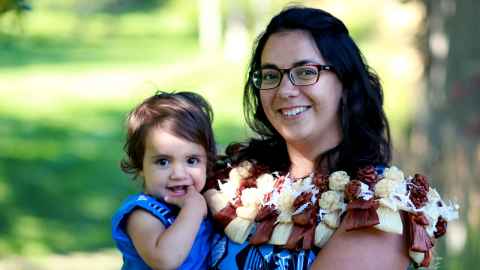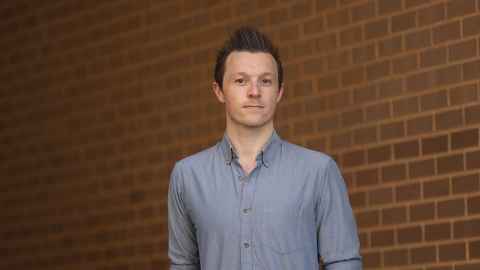Pacific-centred higher education and dementia research: Rutherford Fellows announced
11 November 2021
Two distinguished early career researchers from the Faculties of Arts and Medical and Health Sciences at the University of Auckland are recipients of the $800,000 Rutherford Discovery Fellowship from the Royal Society Te Apārangi.

Higher education needs to change
A complete reimagining of higher education that focuses on Pacific ways of knowing is the focus of Dr Sereana Naepi’s Rutherford Discovery Fellowship.
A lecturer in the sociology programme at the University’s Te Puna Mārama, Faculty of Arts, Dr Naepi says that from the time the first universities were built, research has shown they were designed with the privileged in mind.
“And they still maintain an unfair system toward women, gender diverse, Indigenous and racialised people. While many universities increasingly express the importance of diversity, they routinely do not practice it – with people’s everyday experiences and the numbers telling a different story.”
She says many researchers, including herself, have identified issues within Aotearoa’s universities that stem from neoliberalism, colonialism and structural racism. However, few have provided solutions or methods for change.
“Which is why I’m so thrilled to receive this prestigious fellowship for research into an area I feel so committed to,” she says.
In her project ‘Planning for Change’ Dr Naepi proposes to make higher education more inclusive by moving away from historically dominant systems.
To change from a deeply ingrained, segregated structure towards an alternative space that recognises all types of people and knowledge in Aotearoa will require tagata Pasifika – all peoples of the Pacific.
Instead she will present a new model that centres on Pacific ways of knowing and creating knowledge. From these models, she believes, we can explore institutional change through how we relate to each other and the university.
In four interwoven stages, the study will look at experiences of neoliberalism at universities and mechanisms for future strategic change, visualise a higher education sector from a Pacific standpoint and establish how Pacific ways of learning can transform knowledge production.
All four stages will be grounded in Pacific research methodologies including talanoa, which often takes the form of an open, informal conversation between people in which they share their stories, thoughts and feelings, and build knowledge through relationships.
By engaging in richer conversations with people at all levels – inside and outside universities – about the possibilities of a different higher education system, Dr Naepi believes it will be possible to create “big plans for change”, but as with any such radical change, will need the will of many.
“To change from a deeply ingrained, segregated structure towards an alternative space that recognises all types of people and knowledge in Aotearoa will require tagata Pasifika – all peoples of the Pacific,” she says
Dr Naepi is of Fijian and Pākehā whakapapa and has a PhD from the University of British Columbia in Canada.
She has conducted research into equity in higher education nationally and internationally, and was the founding associate director of All My Relations, an Indigenous research centre at Thompson Rivers University (Canada). She also co-founded the award winning Indigenous research development programme Knowledge Makers in Canada.

Revolutionary approach to slowing dementia
Dr Justin Rustenhoven’s Rutherford Discovery Fellowship is to research a way of helping the brain to clear away waste, with the aim of alleviating cognitive decline from aging and Alzheimer’s disease.
The human brain requires a large amount of energy to function and the waste produced from this energy production has to be removed, or it will build up in the brain.
Our bodies achieve this through the lymphatic vessels, situated in the tissues surrounding the brain, which work like drainage pipes removing waste. During aging or in Alzheimer’s disease, these pipes shrink.
Dr Rustenhoven will investigate how inflammation in the lymphatic vessels around the brain contributes to lymphatic dysfunction. If this can be reversed, it could offer new hope for therapies for slowing dementia, as opposed to current treatments which can only manage disease symptoms.
“I am absolutely ecstatic to be recognised by receiving this prestigious award,” says Dr Rustenhoven, who will return to New Zealand from the US to start the research early next year.
He will be mostly based in the University’s Centre for Brain Research, working with Professor Mike Dragunow and Professor Richard Faull. He will also be working with Professor Rod Dunbar at the School of Biological Sciences and Maurice Wilkins Centre, as well as Professor Margaret Brimble in the School of Chemical Sciences and School of Biological Sciences.
Now I am delighted to be able to return to the University of Auckland
where I can bring back these skills and continue this critical research,
supported by this generous fellowship, such a distinguished mentorship team, and world-class resources.
He will also maintain close ties to Washington University in St Louis in the US.
“I left New Zealand after my PhD with the intention of honing my knowledge and skillset in the fields of neuroimmunology and vascular biology, and have spent four fruitful years in the United States doing so,” says Dr Rustenhoven.
“Now I am delighted to be able to return to the University of Auckland where I can bring back these skills and continue this critical research, supported by this generous fellowship, such a distinguished mentorship team, and world-class resources.”
Dr Rustenhoven completed his PhD in pharmacology at the University of Auckland in 2017, for which he received the Vice-Chancellor’s Prize for Best Doctoral Thesis.
He then travelled to the US to do postdoctoral research, first at the Centre for Brain Immunology and Glia at the University of Virginia, and later at the Department of Pathology and Immunology, Washington University of St Louis.
Media contacts
Julianne Evans | Media adviser | Faculty of Arts
M: 027 562 5868
E: julianne.evans@auckland.ac.nz
Paul Panckhurst | Media adviser | Faculty of Medical and Health Sciences
M: 022 032 8475
E: paul.panckhurst@auckland.ac.nz